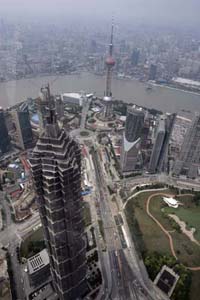
Article
The world is in the midst of great geopolitical change. Old superpowers are waning, new ones are rising, alliances are shifting—what lies ahead?
Learn the why behind the headlines.
Subscribe to the Real Truth for FREE news and analysis.
Subscribe NowGenerally, human beings are wary of change—particularly change that is uncertain or negative. Such is the common sentiment among Americans in recent months. Several polls show that the vast majority of the U.S. population is unhappy, concerned and otherwise gloomy about the country’s current and future status.
As journalist Fareed Zakaria wrote in Newsweek, “Americans see that a new world is coming into being, but fear it is one being shaped in distant lands and by foreign people.”
Great geopolitical change is occurring; a “new world” is indeed emerging. Mr. Zakaria and others have referred to this as the “rise of the rest”—suggesting that the newfound wealth and might of China, India, Brazil and other nations will create a new balance between the West and “the rest.”
Others suggest there is an increasing imbalance of power, particularly regarding energy-based wealth. Thomas Friedman of The New York Times, for example, referred to congressional testimony suggesting that OPEC nations could, with oil at $200 a barrel, “potentially buy Bank of America in one month worth of production, Apple Computers in a week, and General Motors in just three days.”
In recent years, many have considered the United States the world’s only superpower. According to most definitions, they would be right, even today—while “the rest” are rising, the U.S. is still the only nation that can project its military power around the world.
Yet some suggest that America’s military strength is waning, propped up by the country’s economic “house of cards”—which could fall in a moment’s notice. At the same time, other nations that have risen economically could almost just as quickly expand their military power.
Four World-Changing Events
Consider four important events in recent history that signified the beginnings of major change in the geopolitical world.
First was the 1990 reunification of Germany. This finally allowed Europe’s largest country to integrate into the European Community (which later became the European Union).
This occurred at the same time as the second major event: the dissolution of the Soviet Union. With the significant loss of territory and economy due to the secession of several republics, the USSR had lost the Cold War with the West.
The third major event was the economic rise of China during the 1990s. Reforms from the 1970s had begun to be realized. Socio-political unrest during the 1980s had been addressed. Witnessing the fall of the fellow Communist USSR, the Chinese government took steps to consolidate political power. In a few short decades, China went from a poverty-stricken country to a major world power.
The fourth event was the September 11, 2001 attacks on the U.S.—which forced America to address the anti-U.S. ideology that was fermenting among various Islamic extremists, particularly the Taliban and al-Qaeda. For better or worse, the ongoing wars in Afghanistan and Iraq have resulted in the deaths of thousands, but have also prevented (at least to date) any successful terrorist attack on American soil. While 9/11 has primarily been seen as a U.S. issue, it influenced other Western nations, especially certain European ones, to take various socio-religious steps that will be significant in the near future.
The Emergence of China
While change is often bad for some, it is usually good for others. This is certainly the case for China. The restructuring of its economy has resulted in a tenfold increase in the gross domestic product since 1978. On a purchasing power parity basis, China became the world’s second-largest economy after the United States in 2007.
 AFP/Getty Images
AFP/Getty Images AFP/Getty Images
AFP/Getty ImagesWhile its rural areas and population remain an economic challenge for the Chinese government, the amazing fiscal growth of the past 20 years has brought tremendous prosperity to a growing middle-class. Foreign visitors describe the old cities as “ultra-modern.” As the industrial complex spreads across the country, the central government builds and connects entire new cities.
As is usually the case, increased economic prosperity brings increased nationalism. More than 90% of the 1.3 billion people are Han Chinese. Sharing a common culture, history and written language, they are the world’s largest homogeneous ethnic group.
Mr. Zakaria described a conversation he had with a young Chinese executive. Though he looked and sounded markedly Western, when they discussed topics such as Taiwan, Japan and the United States, the executive responded with “passion, bellicosity, and intolerance. I felt as if I were in Germany in 1910, speaking to a young German professional, who would have been equally modern and yet also a staunch nationalist” (Newsweek).
The May 2008 cover of The Economist, which featured the article “Angry China,” depicted a picture of a dark, fierce-looking dragon. This was in response to the crisis in Tibet and the ensuing Chinese fury expressed at the pro-Tibetan protests that shadowed the Olympic torch relay around the world. The article argued that with the Tibet issue as the starting point (and the alleged “anti-China” bias of the Western press), “China’s defenders have gone on to denounce the entire edifice of Western liberal democracy as a sham. Using its tenets to criticise China is, they claim, sheer hypocrisy. They cite further evidence of double standards: having exported its dirtiest industries to China, the West wants the country to curb its carbon emissions, potentially impeding its growth and depriving newly well-off Chinese of their right to a motor car.”
A month later, the International Herald Tribune reported on a Pew Global Attitudes Project survey, showing that people outside China worried about the nation’s growing military power, its influence on affairs in other nations, and the harm it is causing the environment. “In Western Europe,” the report stated, “majorities believe either that China has already replaced the United States as the world’s leading superpower or that it will at some point replace the United States.”
This is in contrast with most experts who suggest that while China’s economic growth has been and will likely continue to be impressive, it will not eclipse the U.S. Writing in the New York Times, Josef Joffe, editor of the German newspaper Die Zeit, calculated that even if China was able to sustain an indefinite growth of 7%, while the U.S. maintained its historical rate of 3.5%, China’s GDP would total $12 trillion by 2028—far below the projected U.S. GDP of $28 trillion.
William Pfaff, in an article titled “China: the pretend superpower,” made a similar argument. But he also pointed to the “massive, backward, impoverished and politically restless Chinese agricultural population, and the likelihood—I myself would say the certainty—of a major and possibly revolutionary political crisis in China in the foreseeable future” (The International Herald Tribune).
David Rothkopf, a visiting scholar at the Carnegie Endowment, suggests in his book Superclass, that the influence of the nation-state (and all the organizations based on it, such as the United Nations, the World Bank, the IMF, etc.) is waning, and therefore a power void is being created.
A small group of players—“the superclass”—a new global elite, is filling the void. Some “are from business and finance,” Mr. Rothkopf stated. “Some are members of a kind of shadow elite—criminals and terrorists. Some are masters of new or traditional media; some are religious leaders, and a few are top officials of those governments that do have the ability to project their influence globally.”
The “superclass” theory may sound somewhat unconventional, and even a little conspiracy theory-esque. Yet it harkens back to a time when empires were not empowered entirely by a single nation-state and its government, but rather by a combination of political and socio-religious factors from several states, both “good” and “evil.”
Europe—Still Some Growing Pains
Despite expanding by ten nations in 2004, and another two in 2007, the European Union has struggled politically. The Treaty of Nice, implemented in 2003, was to ensure that the enlarged 27-member union would continue to operate relatively efficiently. However, attempts at a European Constitution in 2004 failed to reach unanimous ratification, following French and Dutch referendums.
Since then, the Reform, or Lisbon, Treaty proposed to amend existing treaties instead of replacing them (as the Constitution would have). However, a June 2008 referendum in Ireland, which rejected Lisbon, has once again put most political progress in Europe on hold. Unless Ireland can be convinced to vote again (and respond with a “yes”), the Lisbon Treaty will die; the EU will continue to operate under the Treaty of Nice.
Meantime, with a total landmass slightly less than one-half the size of the United States, the European Union has a population of just under 500 million, and a GDP (purchasing power parity) in 2007 of $14.38 trillion—larger than that of the U.S., and more than twice that of China.
The Economist stated that Europe and China have several things in common. Many Europeans are “rather relaxed” about America losing its status as the world’s lone superpower. It also points out that the EU is already China’s largest trade partner, with the two-way flow topping $400 billion in 2007. In addition, both China and Europe do not see each other as a military threat.
European relations with Russia, however, are more challenging. While the EU has expanded to the east, often absorbing former Soviet-states as members, Russia has enjoyed its ability to divide Europe. Disputes regarding Ukraine, Serbia, Poland and others continue to be difficult, and Europe’s reliance on Russian gas and oil is an ongoing issue.
In any case, Russian-German relations are a little more realistic, with leaders of each country being the first to visit each other after Russian President Dmitry Medvedev’s recent election. The new president said during German Chancellor Angela Merkel’s visit to Moscow, “We highly appreciate your coming here and consider the visit as a continuation of the strategic cooperation and partnership that has traditionally existed between Russia and the Federative Republic of Germany” (Xinhau).
One outcome from the Lisbon failure is a possible two-speed Europe: a smaller, progressive core, with a larger group of “associate members,” or partners. Political events, along with world events, will dictate whether this will become the avenue for Europe’s continued rise.
Keep in mind also that, in recent years, the U.S. has been pushing the EU for an increased role in security/military issues globally. NATO and the United Kingdom have complicated this issue, but at some point, they will have to fade to the back.
A Lone Superpower?
For now, the United States remains the world’s lone superpower. Despite the military reductions of the 1990s, it still has the most bases and personnel around the world. The U.S. Air Force and Navy are simply unrivalled, and the nation’s annual military budget remains the largest in the world by far.
Yet America’s global power and influence are quickly fading. With military strength at least somewhat based on economic power, and recent months showing that the U.S. economy is in a fragile state, America could one day find it is unable to fuel its jets or replenish its missile supply. How much longer can the federal government “bail out” various banks and mortgage companies, while spending tremendous amounts of money on the wars in Iraq and Afghanistan?
London has (again) surpassed New York as the world’s financial capital for stock listing. Global markets increasingly invest money in European banks instead of American ones. Persian Gulf oil exports are diversifying their currency holdings into Euros instead of U.S. dollars.
The article “Waving Goodbye to Hegemony” (International Herald Tribune) suggests that the “Second World” countries (those after China, the EU and the U.S., but above the Third World) are making plain they want a part of the “European dream”—not the American one. In addition, the Second World has increasing power, primarily based on foreign exchange reserves and their relative spending power. The article suggests that to understand them, one must think like them. It is no longer an “us vs. them” (like the Cold War) or “you’re either with us, or against us” (like the early years of the “War on Terror”) world. These Second World nations are looking after themselves first.
Throw Iran into the fray, and you have a country that has been successful at dividing the U.S. and Europe (by primarily using the sensitive “Israel card”), while establishing a strategic partnership with China, enabling the dragon to reach the Persian Gulf without relying on the narrow Straits of Malacca. A U.S.-led (or supported, if Israel took the lead) attack on Iran would likely have dire economic consequences, never mind diplomatic challenges from Russia and China.
Could the U.S. military even support a major attack against Iran? What would happen if the region broke out into a full-scale war (such as Syria/Hezbollah attacking Israel, possibly with Egypt drawn in)? Certainly, the current strain and stress on U.S. forces is an issue.
In any case, the U.S. has also had its military ability and technology in action and “on display” for the rest of the world during the last several years. No doubt, the Chinese, Germans and others have paid close attention, and gathered as much information as possible. They will use this information to their best advantage.
Three “Nations” in Prophecy
Believe it or not, the future of China, the European Union and the United States are primary components of Bible prophecy, providing a picture of what lies ahead for the world.
The European Union is foretold to transform into a military/economic juggernaut—a “United States of Europe” that will be a great socio-political world force, combining tremendous economic power (Rev. 18:18-19) with a powerful and convincing religion (Rev. 13:11-15).
China will also play a leading part on the world stage, aligning itself with Russia (Rev. 9:16) to challenge the European power initially.
Yes, the Bible reveals that Europe and China (allied with Russia) will influence and dominate foreign affairs. However, the United States and her sister nations—Britain, Australia, France, Canada and others—will suffer dramatic reversal.
To learn more, read David C. Pack’s book America and Britain in Prophecy.
More on Related Topics:
- Haiti Faces a Sexual Violence and Abuse Crisis as Gang Violence Spreads, Health Charity Warns
- As Haiti Faces Further Political Turmoil, the UN Signals More Troops on the Way
- Hopeful Yet Wary, Venezuelans Across Latin America Mull Going Home
- Their Homes Survived the Historic LA Area Wildfires. A Year Later, They Fear Living in Them
- U.S. Travelers Scramble to Adjust as Airlines Cut Flights Because of Shutdown



